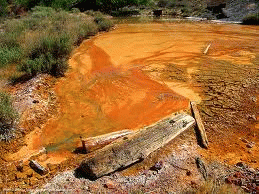With her 1962 book, Silent Spring, Rachel Carson got DDT and other synthetic pesticides banned and saved bird life. Today it is humans who are directly threatened by technologies designed to extract the maximum profit at the lowest private cost and the maximum social cost from natural resources.
Once abundant clean water has become a scarce resource. Yet, in the US ground water and surface water are being polluted and made unusable by mountain top removal mining, fracking and other such "new technologies." Ranchers in eastern Montana, for example, are being forced out of ranching by polluted water.
Offshore oil drilling and chemical farming run-off have destroyed fisheries in the Gulf of Mexico. In other parts of the world, explosives used to maximize short-run fish catches have destroyed coral reefs that sustained fish life. Deforestation for short-run agricultural production results in replacing bio-diverse rain forests with barren land. The "now generation" is leaving a resource-scarce planet to future generations.
Nuclear power plants are thoughtlessly built in earthquake and tsunami zones. Spent fuel rods are stored within the plants, a practice that adds their destructive potential to a catastrophic accident or act of nature.
The newest threat comes from genetically modified seeds that produce crops resistant to herbicides. The active ingredient in Monsanto's Roundup herbicide is glyphosate, a toxic element that now contaminates groundwater in Spain and according to the US Geological Survey is now "commonly found in rain and streams in the Mississippi River Basin."
In 2011 Don Huber, a plant pathologist and soil microbiologist, wrote to the US Secretary of Agriculture about the unexpected consequences of GMOs and the accompanying herbicides. He cited adverse effects on critical micronutrients, soil fertility, and the nutritional value of foods. He cited the impairment of metabolic pathways that prevents plants from accumulating and storing minerals, such as iron, manganese, and zinc, minerals important for liver function and immune response in animals and people. He cited toxic effects on the microorganisms in the soil that have disrupted nature's balance and resulted in large increases in plant diseases. He cited livestock deaths from botulism, premature animal aging, and an increase in animal and human infertility.
In an interview, Huber said that the power of agri-business has made it almost impossible to do research on GMOs and that regulatory agencies with the responsibility of protecting the public are dependent on the industry's own self-serving studies and have no independent objective science on which to base a regulatory decision.
In short, in order to secure bumper crops for several years, we are destroying the fertility of soil, animal and human life.
Mankind has been destroying the world for a long time. In his fascinating book, 1493, Charles C. Mann describes the adverse effects on the environment, people, and civilizations of the globalism unleashed by Christopher Columbus. These include the international transfer of human and plant diseases, deforestation, destructions of peoples and empires, and the impact on distant China of Spanish new world silver.
Mann provides a history lesson in unintended and unexpected consequences resulting from the actions of elites and of those that elites dominated. The Chinese government fixed taxation in terms of the quantity of silver, but the importation of Spanish silver inflated prices (decreased the value of a given quantity of silver) and left the government without sufficient revenues.
A successor government or dynasty evicted Chinese from the coast in order to deprive pirates of resources. The displaced millions of people deforested mountainsides in order to sustain themselves with terrace agriculture. The result of deforestation was floods that not only washed away the terraces but also the crops in the fertile valleys below. Consequently, floods became one of China's greatest challenges to its food supply.
The first slaves were conquered new world natives, but the "Indians" had no immunity to European diseases. The second wave of slaves were European whites, but the Europeans had no immunity to malaria and yellow fever. By default slavery fell to blacks, many of whom had immunity to malaria and yellow fever. Thus, a black workforce could survive the infected environments and newly created wetlands in which to raise sugarcane, wetlands that were ideal homes for malaria and yellow fever bearing mosquitoes. Mann, of course, is merely reporting, not justifying black or any slavery.
Mann points out that the lowly mosquito had a large impact on American history. The Mason-Dixon Line roughly splits the East Coast into two zones, the South in which disease carrying mosquitoes were an endemic threat, and the north in which malaria was not a threat. In the South, a person who survived childhood and grew into an adult had acquired immunity. Northerners had no such protection.
This had enormous consequences when Northern armies invaded the South. Mann reports that "disease killed twice as many Union troops as Confederate bullets or shells." Between the summers of 1863 and 1864, the official annual infection rate for what was called "intermittent fevers" was 233 percent. The average northern soldier was felled more than twice. In one year 361,968 troops were infected. Most of the deaths from malaria were indirect. The disease so badly weakened the troops that they died from dysentery, measles or strep infection.
The mosquito was the South's most powerful ally and so prolonged the war, despite the vast numerical superiority of the Union force, that Lincoln was forced to take action that he opposed and declare emancipation of slaves. Thus, Mann writes, it is not farfetched to conclude that blacks were freed by the very malaria mosquito that had caused blacks to be the preferred workforce.
(Note: You can view every article as one long page if you sign up as an Advocate Member, or higher).






